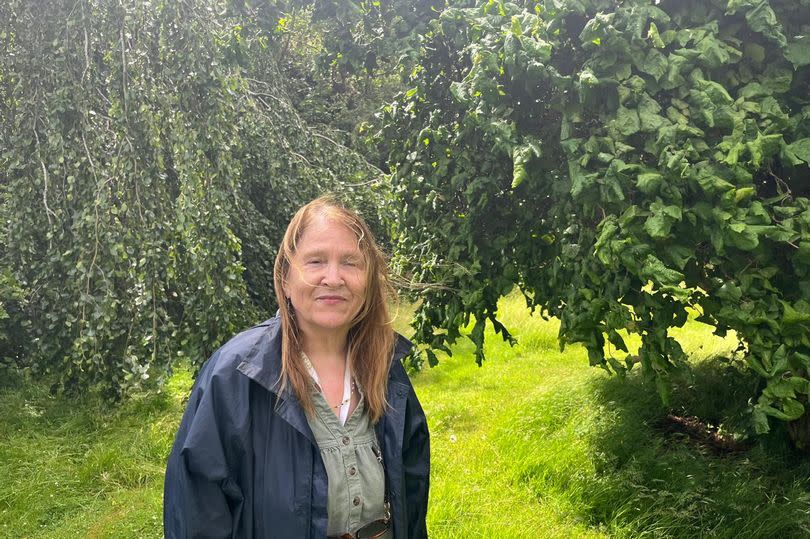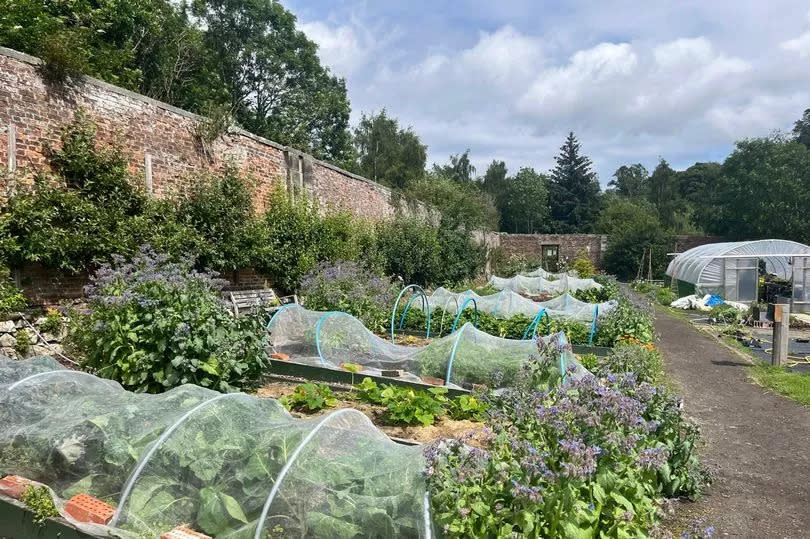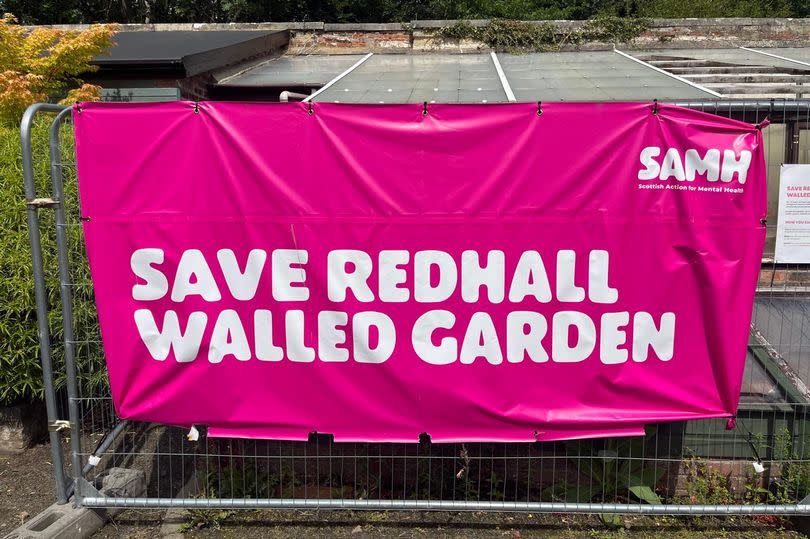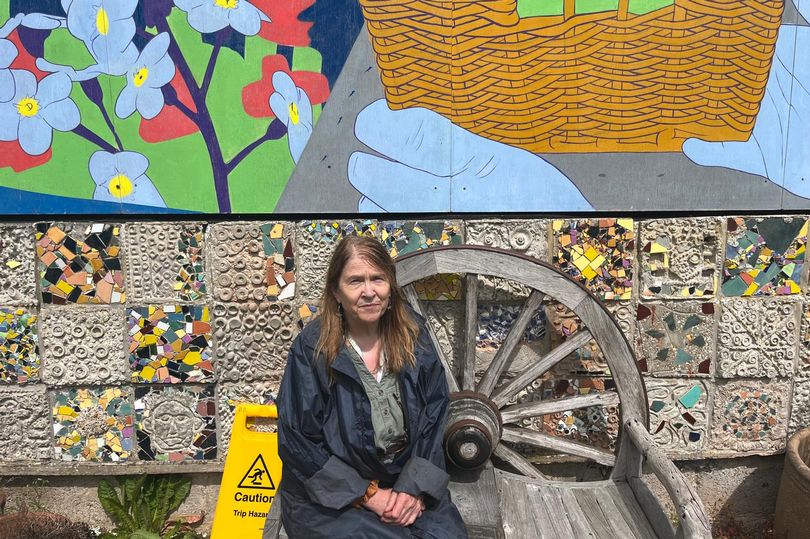A woman who lost her home while caring for her anorexic daughter says an Edinburgh charity at risk of closure is a “life saver”.
Janet Kramer, 70, began struggling with anxiety and depression after her daughter started intensive treatment for anorexia. Only when she discovered Redhall Walled Garden did Janet begin to improve, and the charity soon became the “centre” of her life.
The service, a gorgeous community garden tucked in a glen off Lanark Road, is entirely maintained by people struggling with mental illness.
READ MORE: Edinburgh police swoop on residential street as ’emergency incident’ unfolds
READ MORE: Gangland enforcers Tamo Junto warn ‘accept no imitation’ in chilling video to imposters
However, the pioneering mental health charity is at risk of closure due to funding cuts from the Edinburgh Integrated Joint Board (EIJB), which announced its intention to slash £2.2 million in funds to social care charities. Redhall Walled Garden, along with other charities in the Thrive Collective, are looking down the barrel of closure if the cuts move forward.
The EIJB has proposed cancelling Redhall’s contract, which would leave dozens of trainees – many of whom have relied on the garden for as long as 15 years – in the lurch, according to to Claire Reynolds, senior service manager for the Scottish Action for Mental Health.
For Janet, the service came at a pivotal time in her life when she was in a dark place. Redhall offered community, emotional support, and a unique holistic approach to treating mental illness.
She said: “Caring for someone who has mental illness can also affect the person who’s caring. I was a mess. I went to the Carers Council for some support and they recommended Redhall. I can’t even tell you how it’s helped me, because it gave everything that I lost back to me.

Janet found Redhall while struggling with anxiety and depression -Credit:Edinburgh Live
“I feel safe here. It’s not just gardening, because a lot of us are all in the same position. We all have mental health issues and we understand each other because we don’t have to explain constantly, as you probably do to the outside world.”
Janet spends three days per week learning horticulture, planting food crops, and maintaining the expansive grounds. The unique approach to treating mental illness provide structure, purpose, physical exercise, and social interaction. Set against an idyllic backdrop, the Garden is a remarkable natural space for people to heal.
She added: “I don’t need anxiety medication. I don’t need physical therapy. I get that here. I don’t feel isolated. It dispels that feeling of being cut off from the world. That’s incredibly helpful to me to be able to put my own mind to right so I can support my daughter, who is getting better, so she relies on me. It’s not a guilty indulgence coming here. It’s a necessity.
“It’s, it’s the centre of my life at the moment, and has been for the last four years. Some people have been here for 15 years.”

Trainees grow vegetables and flowers as well as maintain the entire garden -Credit:Edinburgh Live
But trainees are concerned about the Garden closing in the near future as potential EIJB cuts loom. For many, Redhall Walled Garden has provided a lifeline which keeps them out of hospital and statutory mental health services.
Janet added: “It scares me for some of the people that might lose this support because it’s a lifesaver, and I’m not being overdramatic.
Join Edinburgh Live’s Whatsapp Community here and get the latest news send straight to your messages.
“Some people have been coming here for 15 years, so it’s the center of their lives. It’s like taking the spine out in the middle of your life. It would be incredibly devastating. I can’t believe that in the desert of mental health services at the moment, this is an oasis, and there is nothing to replace it.
“Why would you take this away? It’s a good return on their investment. The labor is free. People are helping themselves instead of needing physiotherapy.
“I think coming here is more important to me than any pills I’ve been given. It’s more efficacious than any medicine I’ve ever had, and it’s pulled me out of what would have been a slide into more depression and isolation. It’s been a lifesaver, and the secret of this garden is that it heals people.”

The charity is at risk of closure -Credit:Edinburgh Live
The therapeutic horticultural project has operated in Edinburgh for the past 40 years. Claire says Redhall prevents people being sent to Edinburgh’s already-overwhelmed statutory services by providing preventative mental health services.
The SAMH boss said: “[The EIJB cuts] are a radical disinvestment of community mental health services in Edinburgh. This isn’t a chipping away of services, it’s a complete eradication of mental health supports that people go to.
“We are very concerned about the human impact and of loss of life [this would cause] through people’s mental health deteriorating to the point where they are needing hospitalization.
“We really want the Health and Social Care Partnership to consult with the people affected by these changes instead of the radical removal of all support at the same time.”
In an effort to protect vital mental health services like Redhall Walled Gardens, a petition has been launched by Scottish Action for Mental Health. More information on the petition and how to sign it can be found here.
Councillor Tim Pogson, Chair of the Edinburgh Integration Joint Board said: “The IJB funds a range of non-statutory services with third sector providers, through block contracts and service level agreements. We are currently carrying out a review of this spend, with the aim of reducing annual spend by £2.2 million. We are taking time to consider this proposal to assess the data and evidence on the impacts of any changes, and to consider the concerns raised by providers, service users and others.
“The level of funding Edinburgh’s IJB receives has not kept pace with the increased demand and cost for our services. We are also being asked to care for people with more complex needs. As a result, the EIJB has had to make cuts of around £100m over the last three years which has been very challenging.
“We recognise the contribution that our third sector providers make and the concern this may cause, however we are now in a position where unfortunately difficult decisions have to be made in order to protect the essential support we provide for some of Edinburgh’s most vulnerable people. This review will enable us to focus scarce resources on the provision of core, statutory services which help keep the people who most need our help safe and well cared for, while allowing our partners to meet their legal duties.”
